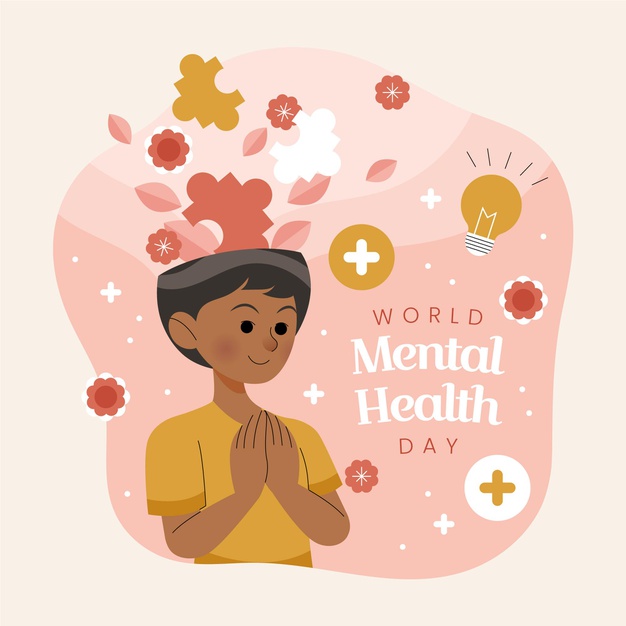Many of us might be aware of the fact that we observe the World Mental Health Day on the 10th of October every year. This year, I thank you for taking out 15 minutes from your busy schedule to read out this article to yourself or to your people.
I would suggest you to not only go through it, but also to reflect on the verity of each information that I give through this. Take sometime and give each question or each fact a thought because my intention here is to help you get an insight of the current situation around us, with regards to Mental Health.
“On 9 February, 2017 Anupriya Patel, Minister of State for Health and Family Welfare, told the Lok Sabha that India had only 3,827 registered psychiatrists. It needed at least 13,500. Patel also told Parliament that India required 20,250 clinical psychologists, but had only 898.”
With regards to this information I would like to raise a question which is, Why is it that both young students and young professionals are told not to take up this field of study because of its limited scope in India?
“The 2015-16 survey conducted by NIMHANS(National Institute of Mental Health and Neuroscience), Bangalore found out that 13.7% of India’s population suffer from mental illness. While 150 million Indians are in dire need of mental health intervention, only 30 million have access to such care.”
Regarding the information that is given above, the question that arises here is that, while medical care is highly commercialized today and thousands of private hospitals are mushrooming in the metropolitan cities why is it that they do not promote emotional wellness?
“In 2015, the Ministry of Health and Family Welfare published details of psychiatrists employed in all medical colleges and hospitals. There were less than 10 psychiatrist in the north eastern state hospitals, while Maharashtra had almost 143 of them. This causes the hike fees of the doctors because of which not many people can reach out to them”
Now, the question here is that, “Why is it that the government sectors do not provide enough free mental health clinic like they do for physical ailments?
“As of February 2017, there are 789 universities, 37,204 colleges and 11,443 stand-alone institutions in India, as per the latest statistics from the UGC website, out of which only around 35% of them has psychology as a core subject.”
Considering this particular information, the question that arises here is that, if the requirement of mental health professionals is so acute then why is it that an initiative to establish psychology departments in the reputed universities not yet taken up?
“What medications can’t do for your mental health, psychotherapy can. Medications, psychotherapy and their combination have been shown to help people is more effective than medications alone.”
Then why is that people do not seek therapy as much as they seek out for medications? Why is that psychologists are not given equal respect as psychiatrists even today?
“Having a mental illness does not mean you are “crazy.” It means you are vulnerable. There is a large difference between structured talking therapies and speaking with friends.”
In that case why is it that we still cannot get rid of the myths and misconceptions about mental health issues? Inspite of all the awareness programmes why is it that we are still struggling to destigmatise it?
“Using clinical terms in casual contexts diminishes the true effect that these words have. Mental illness is a serious, diagnosable condition that is a daily reality. It doesn’t come in waves, or on just one really bad day.”
“Then why is it that people use terms like depression, bipolar, OCD so casually?”
It is very clear that we have a very long way to go. We need to be aware of all the misconceptions regarding mental health, at all times and also we should take an initiative of rectifying someone who is not aware.
We need to be alert every second, because our insensitivity is harming innumerable people, both mentally and physically.
This World Mental Health Day let us unitedly take vow to convey a robust message to a larger mass. Sometimes listening is all that it takes. So let us learn to ‘Listen’ to what the other has to say. Let us ‘Validate’ what the other feels and let us ‘Empathise’ whenever required. Let us be veracious as we reflect on the official theme of this year which is ‘Mental Health for All: Greater Investment- Greater Access’ and stop assuming the more risk prone groups.
It is not only the marginalized people, the helpless farmers or the vulnerable adolescents who need help. It could be anyone, anywhere. Let us be a little more liberal and warm in the way we approach and accept others.
References:
- www.huffingtonpost.in
- www.ugc.ac.in
- www.apa.org
- www.dailyuw.com
- www.medicalnewstoday.com
- www.nami.org































No Comments
Leave a comment Cancel